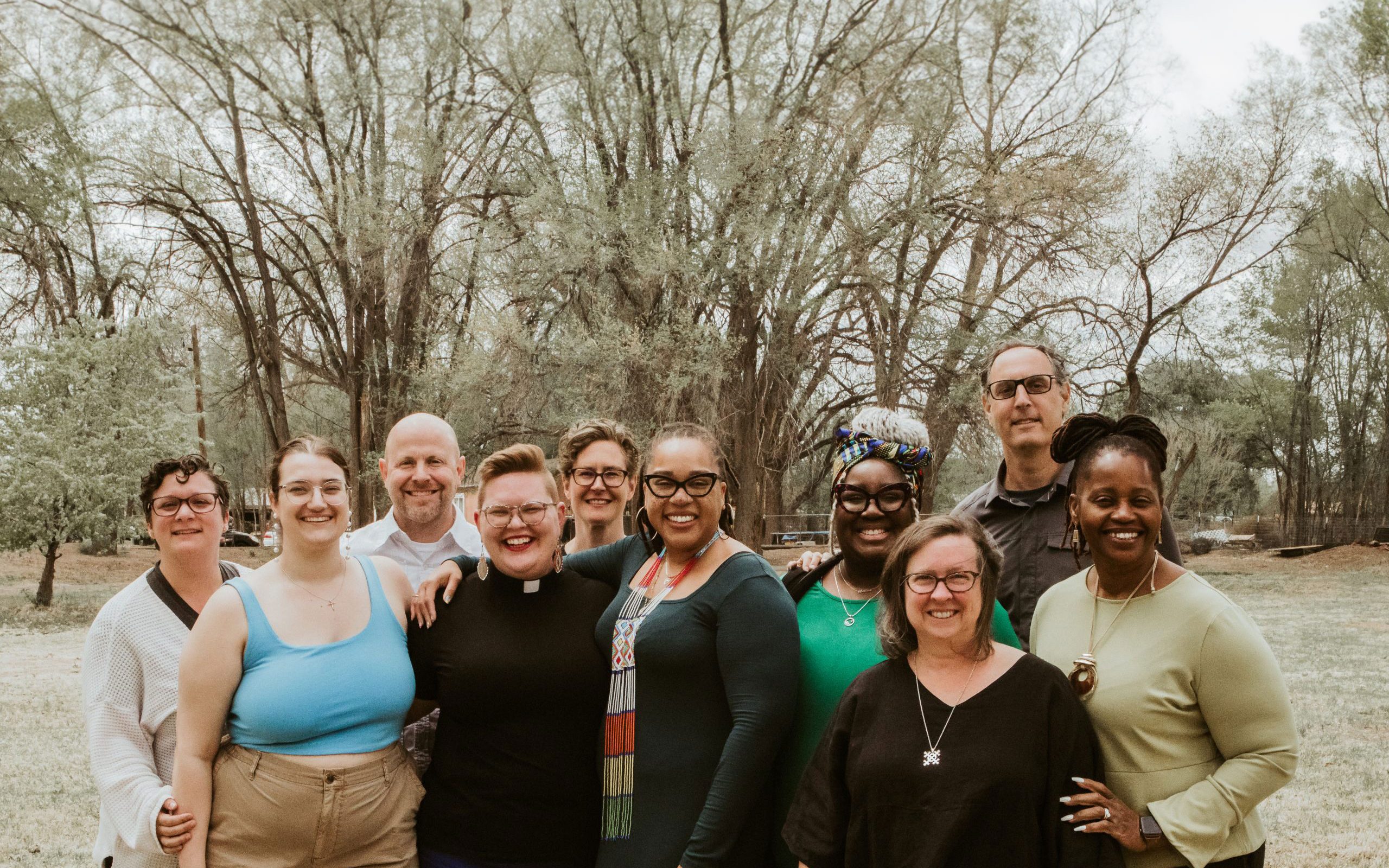SACReD Story, SACReD People

Vision
In a SACReD world, religious communities shift the culture to make Reproductive Justice a lived reality.
Mission
Our mission is to create and equip a network of spiritual communities with liberative religious education & practices that shift our culture to advance Reproductive Justice. We affirm bodily autonomy and moral agency, celebrate healthy sexuality, and advocate for reproductive dignity to support the flourishing of all people and families.
Core Values
Grounded in the principles that are at the heart of our religious traditions, such as pikuach nefesh (to save a life), kujichagulia (self-determination), and imago dei (image of God) SACReD’s core values are:
Joy: For SACReD, there is an undefinable gladness in knowing you are the co-creator of your life with the Divine in the pursuit of flourishing. Joy is always communal. Joy persists.
Justice: SACReD utilizes the Reproductive Justice framework. Justice to us is an embodied balancing of power that brings about healing, accountability and liberation.
Wholeness: SACReD believes that each person is born complete, good, worthy, and beloved. As we end systems of oppression, each person will be restored to themselves, one another, and the Divine.
Compassion: Being with; SACReD accompanies people through all their reproductive journeys, meeting people where they are physically, mentally, emotionally, and spiritually.
SACReD exists because, as people of faith, we cannot abide the suffering and oppression caused by reproductive injustice:
- The stripping of people’s bodily autonomy and moral agency
- The inaccessibility of birth control, abortion, and maternal healthcare for many
- The meager wages that don’t support parenting
- The poverty, ill-health, racial/gender inequalities, and domestic violence stemming from lack of reproductive autonomy
- The over-policing and polluting of children’s neighborhoods, especially in communities of color
- The soul-injuring indignity and shame heaped by religious institutions upon those choosing not, or unable, to procreate
These conditions are morally reprehensible, and we are spiritually stirred to end them. We also reject a narrow, hollow theology of “life” that attempts to justify neglect of these moral concerns.
Social movements need both numeric and moral power. SACReD’s alliance and coalition partnerships bring exactly that. But this starts with the recognition that certain religious groups and hijackers of religion have done a disproportionate amount of the damage to healthy sexuality and reproductive dignity in this country. Therefore, religious people are uniquely positioned and have a disproportionate role to play in creating healing and justice.
In this context, SACReD works with partners to create a religious movement to change the culture. We break the silence and stigma, hold courageous conversations, critically examine the intersection of religion and Reproductive Justice, and equip leaders to facilitate the work that is specifically ours as people of faith. SACReD plays an essential role in the broader, long-term struggle for social transformation that will bring reproductive liberation for everybody and every body.
We need deep, transformational work in our congregations and our wider culture to meet this moment. While the religious right has justified and advocated for reproductive oppression, faith traditions are and can be a major source of reproductive liberation. By changing the culture around faith and reproductive dignity, we will inspire people to change policy for justice.
SACReD pursues culture change and movement mobilization via these program areas:
Education for Reproductive Liberation
We are not here to dictate specific theologies with respect to reproduction, but we invite congregations to:
- Learn about intersecting systems of oppression that impact reproduction
- Faithfully challenge beliefs that contribute to oppression, shame, and judgment
- Recognize and magnify aspects of their traditions that are wholly consistent with Reproductive Justice
Alliance for Solidarity and Mobilization
Fulfilling our mission is difficult, but deeply meaningful work. We need each other’s inspiration, support, and collaboration to build the power for forging religious institutions and a society that truly manifest Reproductive Justice. SACReD is knitting together a mutually supportive network to grow our power and impact.
Advocacy for Reproductive Justice
Liberation is best practically achieved through a Reproductive Justice agenda, which centers the lived experience of Black women and supports:
- The human right to have a child
- The human right not to have a child
- The human right to parent children in safe, sustainable communities
- The human right to bodily autonomy
We champion this agenda in the public square.
SACReD grew out of the work of decades of faithful struggles for LGBTQIA+ equality, busting abortion stigma, and providing practical support to those who need it.
Numerous religious traditions and denominations have groups working toward inclusion, affirmation, and celebration of LGBTQIA+ people from within. One of the key strategies for over 50 years has been congregational educational and designation programs, such as Welcoming Churches, Open and Affirming, Unity Mosques, The Fellowship of Affirming Ministries, Welcoming Synagogues and Shuls, Reconciling Ministries, and so many more!
These designation processes create space for courageous conversations where individuals examine stories, theologies, and sacred texts, and explore different ethical understandings of sexuality and gender. When we recognize the full humanity and experiences of the people we already know and love in our communities, it’s harder to hold onto a belief or political posture that oppresses them.
Texas has been a frontline in the fight for abortion access for over a decade. In the wake of the omnibus anti-abortion bill HB2 that went into effect in 2013, over half of abortion clinics closed in the state. Clergy came to Texas Freedom Network advocating for a deeper strategy to change the culture beyond the legislative session. What other movements have successfully changed the culture recently?
Building on the tried and true strategy of congregational designations, Texas Freedom Network initiated an innovative congregational designation called Reproductive Freedom Congregations. Seeing the need to expand this work nationally, a diverse group of academics, religious leaders, and representatives from numerous LGBTQ+ and reproductive health, rights, and justice organizations coalesced to create what we now know as SACReD.
We are people who work for a world where families have the resources to flourish, and everyone is free to make decisions about their body with dignity at every stage of life. This is necessary to achieving Reproductive Justice.
SACReD’s current work is conducted by staff, consultants, members of our working committees, and the SACReD Governing Board.
Historically, SACReD came into being throughout 2020-2022 thanks to the labors of love given by representatives of these Founding Organizations:
- All Souls Church Unitarian – Washington, DC
- Auburn Seminary
- California Religious Coalition for Reproductive Choice
- Congregation Beth Israel – Austin, TX
- Emory University – EnFaith Project
- Faith in Women
- The Fellowship of Affirming Ministries
- First Unitarian Church – Dallas, TX
- Florida Interfaith Coalition for Reproductive Health and Justice
- Just Texas – Texas Freedom Network
- Kentucky Religious Coalition for Reproductive Choice
- Michigan Unitarian Universalist Social Justice Network
- Religious Coalition for Reproductive Choice
- SisterSong: Women of Color Reproductive Justice Collective
- Whole Woman’s Health Alliance
Growing out of Texas means that SACReD is infused with deep care and concern for people making reproductive decisions in states hostile to bodily autonomy. SACReD operates nationally, educates people in 40+ states, and connects people virtually, often by region.
In recent decades, there has been little investment in a religious movement supporting Reproductive Justice, which undermines the strength of the broader reproductive freedom movement. The overturn of Roe v. Wade is the result of an intentional 40-year political campaign, and it will take many years to return to the floor that Roe gave us, much less full access to abortion care in all communities.
SACReD seeks to build strong faith-based networks in all 50 states to support local and state-based efforts to promote Reproductive Justice. SACReD provides resources to people across the country to equip them to show up at the local and state level, which, with enough power, creates national impacts.
Staying true to our roots, SACReD seeks to build a web connecting faith communities to the academy, the secular reproductive freedom movement, and beyond, all working together for the sake of Reproductive Justice!
SACReD and members of its alliance, in deep partnership with many others, will absolutely tell a bigger liberation story to its beautiful conclusion, writing it day by day through our work, for as long as it takes.
Leadership
Contact: [email protected]
Governing Board Members
Rev. Rob Keithan
Board Co-Chair
Rev. Iyalosa Estee Nena Dillard
Board Co-Chair
